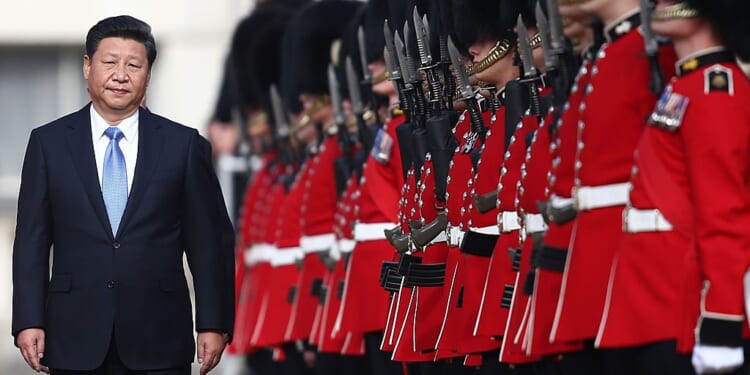Could the Whitehall spying affair be our very own Profumo? So far, at least, there’s less sex — but otherwise the comparisons are ominous. First, there’s the seeming obfuscation from our increasingly un-forensic prime minister. Then, as the establishment finger-pointing started, came mendacity. After all, not all the protagonists, from civil servants, to the Crown Prosecution Service (CPS), to the Labour Party, can be telling the truth. So who, then, is to blame? And, just as intriguing: what structural and political failures underlie such a disaster?
The abandoned criminal case, involving Westminster researchers accused of passing material to Beijing, reveals the ghost in the machine: the British establishment’s rank hypocrisy over what constitutes national security. To put it simply, espionage isn’t espionage when politically it’s inconvenient. For the police and security services, this poses an obvious dilemma. Why bother chasing spies in the first place? Such hypocrisy was ever thus, from the kid-glove treatment of the Cambridge Five, to MI6’s decision to hide Michael Foot’s suspected status as a Soviet “agent of influence” before the 1983 election.
For decades, then, our political culture has been seeped in opacity and hypocrisy, something I’ve encountered myself. As a special branch detective, I remember a routine financial vetting review. This was invasive — yet entirely necessary. Any counterintelligence officer knows employees with money troubles constitute a potential point of compromise. I, a lowly detective, spent hours accounting for every penny I’d spent over the past year.
I saw other incongruities, especially where the Official Secrets Acts was concerned. When MI5 officer David Shayler removed a hoard of secret files from the records section at Thames House, we found them in a newspaper editor’s safe. This constituted several offences, including under the 1911 Official Secrets Act, which features prominently in the Chinese scandal. Created to combat German naval espionage, it is a stuffy Edwardian sofa of a law, its definition of what constituted “damage” to the state better suited to the age of the telegram.
Faced with these challenges in the Shayler case, our financial investigator suggested an elegant solution: simply charge the newspaper editor with the bog-standard offence of Handling Stolen Goods. This, we at Scotland Yard agreed, was a good idea; the CPS, and no doubt the Attorney General, disagreed. This was during the early days of New Labour, when news management trumped all. I later heard rumours that a senior Labour figure confessed there was no appetite for “going to war with The Mail on Sunday.”
This culture of “rules for thee but not for me” runs rampant across all political parties and Whitehall elites. That’s especially frustrating when public bodies spend precious time and resources fostering a “security culture” — one where operational security (OPSEC) is paramount. Intrusive vetting is one common tactic here, with probing questions about a candidate’s political views and private life (sex life included). So-called “clear desk” policies are obsessively policed too: leaving a document on a desk while you pop to the loo can lead to a reprimand. All the while, restrictions are habitually placed on private conduct, from being a member of a controversial political party to having contact with foreign nationals.
Then there are the so-called “STRAP” rules, a codeword to designate a ban on the use of digital devices in areas where sensitive intelligence is handled. Yet as so often, senior police officers, or civil servants, seem strangely exempt here. I remember attending a mandatory GCHQ OPSEC briefing, where a technical officer from GCHQ demonstrated how easily everyday devices can be hacked. When he asked what might shield a phone from hostile compromise, a wag put up his hand. “The rank of chief superintendent and above,” he suggested, “protects mobiles from all foreign intelligence services.”
Like much else in Britain, then, attitudes to secrecy appear two-tier. Over my own career, I often got the impression that senior officials conflate their own importance — and political hobbyhorses — with those of the wider United Kingdom. And as Jonathan Powell may yet learn, backroom deals are all very well until you piss on the wrong people. Either way, realpolitik becomes more difficult in an era of instant rebuttal, quicksilver-fast social media and febrile, impermanent governments.
“Like much else in Britain, then, attitudes to secrecy appear two-tier.”
You grow pretty cynical after a career in the police — but even I’m shocked by the unsightly infighting between the Government and CPS, not least because of the Prime Minister’s previous (and much-referenced) incarnation as director of public prosecutions. The current DPP, Stephen Parkinson, is a Westminster lifer, not known for rocking boats. Significantly, Parkinson is also the first DPP who served as a solicitor rather than a barrister. Could he, finally, be giving the KC old boy’s network the finger, standing his ground against the elite consensus? Such details are the cogs upon which mighty wheels turn. Then there are the Cabinet Office veterans Simon Case and Mark Sedwill, both veritable Jacques Cousteaus of the Deep State, and both immersed in national security matters.
How, then, does this Whitehall’s dead, invisible hand impact actual investigations? The China case is perhaps instructive. Unlike TV spooks, real intelligence officers don’t mysteriously appear at crime scenes and tell the cops what to do. The dark deeds are performed in the Cabinet Office, or in Whitehall pubs. Then there are the courts, where sensitive evidence is subjected to endless voire dire, or meta-trials, as lawyers join silky verbal battle to establish the admissibility of evidence. These arguments happen in camera or in a judge’s chambers, or else involve issuing “Public Interest Immunity” certificates, which render testimony secret. The whole process is typically English: nominally open, but in fact very, very closed. To be fair, opacity is sometimes needed. The state is entitled to keep secrets, but that’s exactly why the privilege shouldn’t be casually abused. Certainly, I suspect the police case was solid — the CPS don’t charge this stuff lightly.
Then there’s the issue of the Government’s attitude to counterintelligence, which occasionally acts as a brake on diplomacy. It’s difficult to drink champagne at the ambassador’s reception if the bloke who planted microphones in the Ferrero Rochers is on trial at the Old Bailey. Capacity is another factor. When I worked on the Alexander Livinenko investigation, almost 20 years ago, MI5’s Russia desk had atrophied. After 9/11, tracking foreign spies was of limited interest to a government focused on counterterrorism and, this being New Labour, “community cohesion”. Besides, City bankers were happily stuffing their Church’s brogues with pilfered Russian cash, earning Britain the nickname “The Laundry”. Given Litvinenko’s murder was a naked act of radiological terrorism, I’m amazed it never escalated further. Which brings us back to money: pre-2008, New Labour bet the bank on financial services, and lost. It’s a gamble we’ve been paying for ever since, as the Chinese know.
This brings us to the nub of the problem, one which Keir Starmer seems to have missed: the Government’s blatant gaslighting over China. In the end, whether or not the People’s Republic constitutes an “enemy” feels insultingly nebulous; as far as I know, such considerations have never been much of an issue before. Besides, even Jonathan Hall, the government’s own advisor on national security law, agrees China is an obvious threat. And Hall, the most fair-minded and experienced barrister in his field, isn’t known for partisanship. This speaks to the depths of high-level disagreement over this issue, with China presenting a unique problem for British policymakers. The communist state views close governmental involvement in private enterprise — including intelligence — as a given. Virtually all Chinese technology, business and diplomacy serves the Communist Party’s insatiable appetite for sensitive information.
And so politicians wilfully ignore the obvious: what we see as spying, the Chinese consider due diligence, simply part of Beijing’s game of hegemonic chess with the United States. In this reckoning, the UK is basically irrelevant, whatever hawks like Tom Tugendhat might imply. We’re surely in no position to retaliate with an intelligence campaign of our own, particularly given the parlous state of our economy. And so, despite our allegedly Rolls Royce civil service, diplomatic corps and spooks, Powell seems to have decided that acquiescence is the only game in town. Counterespionage, old boy? Over-egged. Needs to be seen in context. And, perhaps, those Chinese businessmen will rescue our steel industry in return? Just, whatever you do, don’t tell the plebs.
The entire affair suggests a system in meltdown. Dysfunctional, arrogant and — crucially — impoverished, Britain is caught in a trap of its own design, where we chase Chinese pennies like paupers teased by ancien régime aristocrats. All the while, the national security charade continues. The official secrets, the MI5 briefings and intelligence-gathering. All poured into the colander that is the Cabinet Office, leaked, lost or hacked to whoever wants to steal it. Should the scandal end Starmer’s unhappy tenure as Prime Minister, it would be apt. A lawyer to his bones, he seems convinced he can prove that black is white and night is day, that a secret isn’t a secret and an enemy isn’t an enemy.

















